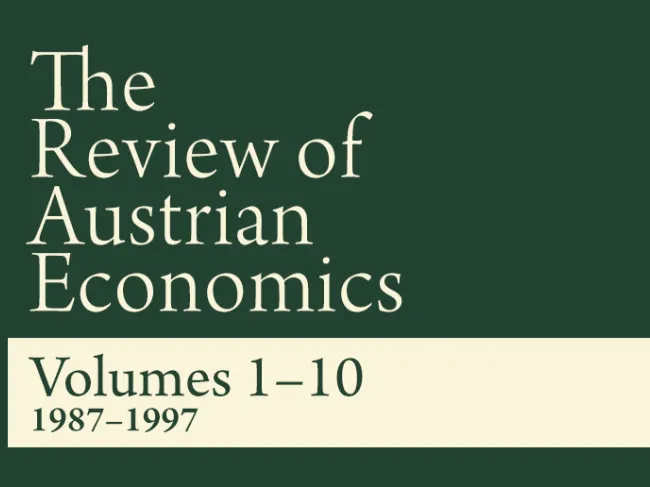The Review of Austrian Economics Vol. 9, No. 1 (1996)
Leland Yeager’s rejoinder “Salerno on Calculation, Knowledge, and Appraisement” (1996) merits a final word, because I believe it makes a subtle though very important concession to the argument made by Rothbard, Herbener, and myself regarding the function of the price system. Before addressing this issue, I will offer comments relating to two other points raised by Yeager in his rejoinder.
1. Yeager (p. 175) denies having said, in his original article (1994), that Salerno, Rothbard, and Herbener (SRH) “equate arithmetic and calculation.” While strictly speaking he is correct, I believe it is a quite reasonable inference from the statements he does make when characterizing the problem confronting central planners who are endowed with perfect knowledge of the economic data. As I have discussed in my Reply (Salerno 1994, pp. 120–23), in SRH’s interpretation of Mises’s argument, granting the unrealistic assumption of complete and perfect information, about either present disequilibrium market conditions or the future final equilibrium state toward which the real market is tending at any moment, does not obviate the need for monetary calculation provided by the market’s pricing process. Yeager (1994, p. 97) states, however, that given “the centralized availability of information,” the argument against socialism “boil(s) down to a contention about arithmetic.” Elsewhere, in questioning the “supposed distinction” that SRH observe in Mises’s writings between calculation and knowledge, Yeager (1994, p. 94) remarks “I cannot believe Mises was merely saying that if the socialist planners possessed in some way all the information normally conveyed by the market prices, they still would be stymied by inability to perform calculations in the narrow arithmetic sense.” What else could Yeager mean by these statements except that anyone who argues that Mises distinguished calculation from knowledge is indeed equating calculation with arithmetic?
2. In stating that “Salerno now focuses attention on ‘appraisement’ (the emphasis is mine)” Yeager is implying that this is a concept I originated in my Reply (Salerno 1994) and that I have, therefore, suddenly shifted the grounds of my initial argument. But in my Reply (ibid., pp. 112–15) I quote at length several passages from my earlier work on this topic, as well as from Rothbard’s, in which the concept of “social appraisement” is elaborated. Far from an ad hoc fallback position, the notion of appraisement was at the heart of the SRH interpretation of Mises from the very beginning.
3. Finally, and most importantly, in the two consecutive paragraphs ending with the penultimate paragraph of his rejoinder, Yeager now abandons his original Hayekian position that the price system, i.e., past prices, automatically conveys to all passive producers all the knowledge that is relevant to their business decisions in a near-equilibrium world. He now concedes that “knowledge” is a primary matter of individual entrepreneurial experience, hunches, reading and personal observation, and superior forecasting of the uncertain future and whose qualitative content is therefore not “normally conveyed by (past) market prices.” Contrary to his claim in the final paragraph of his rejoinder, then, this means that Mises’s concept of economic calculation refers exclusively to the function of the price system in permitting entrepreneurs to appraise the quantitative importance of productive resources in a world where incessant change renders the future very unlike the past and current prices not directly relevant to future-oriented production plans.


